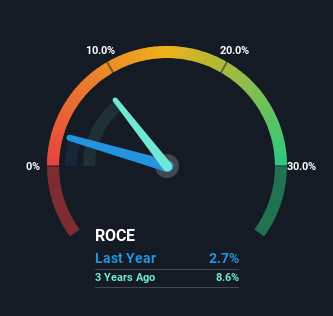Investors Could Be Concerned With HOUSEI's (TSE:5035) Returns On Capital
What are the early trends we should look for to identify a stock that could multiply in value over the long term? One common approach is to try and find a company with returns on capital employed (ROCE) that are increasing, in conjunction with a growing amount of capital employed. This shows us that it's a compounding machine, able to continually reinvest its earnings back into the business and generate higher returns. However, after investigating HOUSEI (TSE:5035), we don't think it's current trends fit the mold of a multi-bagger.
Return On Capital Employed (ROCE): What Is It?
Just to clarify if you're unsure, ROCE is a metric for evaluating how much pre-tax income (in percentage terms) a company earns on the capital invested in its business. Analysts use this formula to calculate it for HOUSEI:
Return on Capital Employed = Earnings Before Interest and Tax (EBIT) ÷ (Total Assets - Current Liabilities)
0.027 = JP¥102m ÷ (JP¥5.3b - JP¥1.6b) (Based on the trailing twelve months to March 2024).
Therefore, HOUSEI has an ROCE of 2.7%. Ultimately, that's a low return and it under-performs the IT industry average of 16%.
Check out our latest analysis for HOUSEI

While the past is not representative of the future, it can be helpful to know how a company has performed historically, which is why we have this chart above. If you'd like to look at how HOUSEI has performed in the past in other metrics, you can view this free graph of HOUSEI's past earnings, revenue and cash flow.
How Are Returns Trending?
Unfortunately, the trend isn't great with ROCE falling from 8.6% three years ago, while capital employed has grown 35%. That being said, HOUSEI raised some capital prior to their latest results being released, so that could partly explain the increase in capital employed. The funds raised likely haven't been put to work yet so it's worth watching what happens in the future with HOUSEI's earnings and if they change as a result from the capital raise.
The Key Takeaway
While returns have fallen for HOUSEI in recent times, we're encouraged to see that sales are growing and that the business is reinvesting in its operations. And there could be an opportunity here if other metrics look good too, because the stock has declined 42% in the last year. So we think it'd be worthwhile to look further into this stock given the trends look encouraging.
HOUSEI does come with some risks though, we found 2 warning signs in our investment analysis, and 1 of those makes us a bit uncomfortable...
For those who like to invest in solid companies, check out this free list of companies with solid balance sheets and high returns on equity.
Valuation is complex, but we're here to simplify it.
Discover if HOUSEI might be undervalued or overvalued with our detailed analysis, featuring fair value estimates, potential risks, dividends, insider trades, and its financial condition.
Access Free AnalysisHave feedback on this article? Concerned about the content? Get in touch with us directly. Alternatively, email editorial-team (at) simplywallst.com.
This article by Simply Wall St is general in nature. We provide commentary based on historical data and analyst forecasts only using an unbiased methodology and our articles are not intended to be financial advice. It does not constitute a recommendation to buy or sell any stock, and does not take account of your objectives, or your financial situation. We aim to bring you long-term focused analysis driven by fundamental data. Note that our analysis may not factor in the latest price-sensitive company announcements or qualitative material. Simply Wall St has no position in any stocks mentioned.
Have feedback on this article? Concerned about the content? Get in touch with us directly. Alternatively, email editorial-team@simplywallst.com
About TSE:5035
Excellent balance sheet with proven track record.
Market Insights
Community Narratives




